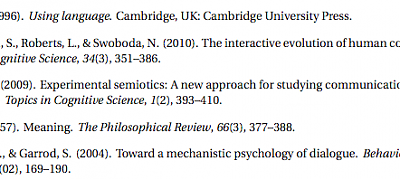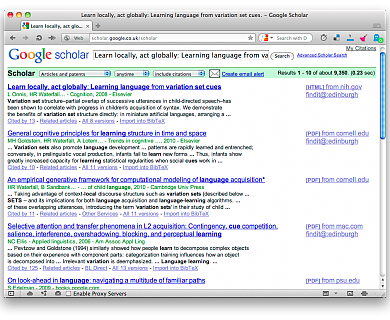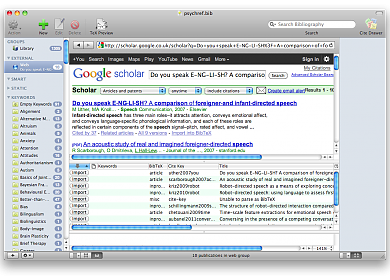Tech-stuff · 12 April 2012 ·
Easing the pain of referencing, part II: Gathering bibliographical information

In part I of this brief guide to academic referencing software, I introduced BibDesk and Mendeley as two examples of full-featured referencing software. In part II, I will briefly hint at different means of extracting bibliographical data from Google Scholar and journal websites, that can be used by BibDesk and other BibTex based software. Some of these hints also work with other reference managers. This article is more advanced than the previous one. You should be reasonably confident in your usage of BibDesk or Bibtex.
From Google Scholar
Google scholar provides a huge database for all sorts of articles and bibliographic information is generally well organised and, with a few exceptions, filtered for non-tex characters, so your Bibtex reference manager shouldn’t throw any errors. Unfortunately, Google Scholar does not provide you with a DOI and authors’ first names. The former is annoying, because the APA citation style requires it, the latter I don’t mind so much, since the initials suffice for most styles. Unfortunately, the initials are not separated by spaces, and the apacite package.
Before you can use Scholar’s BibTex import, you have to activate the feature in the Google Scholar Preferences. After that, every search features an “Import to BibTex” link under each article that will direct you the BibTex markup:
Just copy and paste this into your reference manager. To insert a BibTex reference into BibDesk, you can also press [Apple CMD] + [ALT] + [L].
Google Scholar also provides export into Endnote, Refman, Refworks, and Wenxiangwang. Since I have used neither of those, I cannot comment on how well it does that.
From Journal Websites
Virtually all major publishers and online libraries allow the export references from their websites. Thus, on PLoS One, you simply need to click on “Download … citation” (surprise!), and you will be directed to a dialogue to select the right file. Elsevier’s Science Direct, SpringerLink and JSTOR offer similar links, often randomly scattered on the site.
These sites often offer you either *.bib file or an unnamed text file, that you can simply copy and paste from. Here, the references are more extensive, and also contain DOI and first names of authors. However, non-tex compatible characters are common and references often require a little editing before they compile. If no BiBTex is available, BibDesk users can also revert to RIS).
With BibDesk
BibDesk users can do all this from within the application! BibDesk has an integrated web browser that you can access through the navigation menu on the left, in the main library window. There, after activating Bibtex export in Google Scholar (see above), or simply by browsing journal websites and even Wikipedia (!), BibDesk allows you to import the bibliographic information with a single click:
Unfortunately, this doesn’t work on all sites, and it can a bit temperamental, too.
Summary
Overall, it’s all up to your own preferences what you use. Google Scholar is very reliable for articles, less so for book chapters. Journals’ and Librarys’ tend to suffer from non-tex characters in their citations. However, they win out in terms of the information provided in the citation. Thus, wherever you get your bibliographic data from, you will have to proofread and edit it.
Last but not least, I find Google’s “copy-and-paste BibTex” much quicker to use than the journals’ ‘download-to-file’. BibDesk’s integrated BibTex download is a nice little feature, but sometimes a bit slow and unreliable.
Happy referencing!
Add a comment
Previous comments

